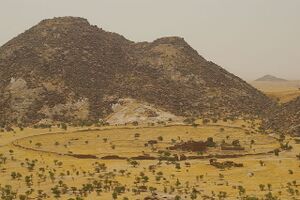
The aim of this page is to recognise, celebrate and encourage the self-empowerment of community agency networks (CANs) and community groups' activism for climate, environment and many other sustainability topics across Chad.
 The resilience of women farmers in Chad battling climate challenges and social barriers, news.mongabay.com (Aug 29, 2024)
The resilience of women farmers in Chad battling climate challenges and social barriers, news.mongabay.com (Aug 29, 2024)
Food security in Chad[edit | edit source]
Chad currently suffers from widespread food insecurity. A majority of the population of Chad now suffers some form of malnutrition. 87% of its population lives below the poverty line. Because the country is arid, landlocked, and prone to droughts, many Chadians struggle to meet their daily nutritional needs. While international aid into the country has brought some relief, the situation in Chad remains severe due to broader famine in the Sahel region. The World Food Programme has declared a state of emergency in the region since early 2018, stating that, “...adding to the poverty, food insecurity and malnutrition which already affects [the nations of the Sahel] to varying degrees, drought, failed harvests and the high prices of staple foods have hastened the arrival of this year’s ‘lean season’ – the worst since 2014.” Malnutrition is high, especially among women and children, with a significant majority of all children in Chad suffering from some form of stunted growth or adverse health effects as a result. As such, health in Chad is greatly affected by lack of food. Food insecurity is a symptom of broader instability in Chad, which suffers from political, ethnic, and religious instability. These issues have contributed to long-term food insecurity in Chad.
News and comment[edit | edit source]
- 2009: Mahamat Zène Bada, the mayor of Chad's capital N'djamena, has noted that irregular rainfall patterns and deforestation in and around the city had led to major flooding in 1999, 2001 and 2008. The city is flanked by two rivers and most people rely on wood products for energy, which causes the deforestation...United Nations Environment Programme, February 27, 2009
About Chad[edit | edit source]
Chad, officially the Republic of Chad, is a landlocked country located at the crossroads of North and Central Africa. It is bordered by Libya to the north, Sudan to the east, the Central African Republic to the south, Cameroon to the southwest, Nigeria to the southwest (at Lake Chad), and Niger to the west. Chad has a population of 16 million, of which 1.6 million live in the capital and largest city of N'Djamena. With a total area of around 1,300,000 km2 (500,000 sq mi), Chad is the fifth-largest country in Africa and the twentieth largest nation by area in the world.
Chad has several regions: the Sahara desert in the north, an arid zone in the centre known as the Sahel and a more fertile Sudanian Savanna zone in the south. Lake Chad, after which the country is named, is the second-largest wetland in Africa. Chad's official languages are Arabic and French. It is home to over 200 different ethnic and linguistic groups. Islam (55.1%) and Christianity (41.1%) are the main religions practiced in Chad.
From 2003, the Darfur crisis in Sudan spilt over the border and destabilised the nation. Already poor, the nation and people struggled to accommodate the hundreds of thousands of Sudanese refugees who live in and around camps in eastern Chad. W
See also
local information and news can be found, or shared, via our many location pages